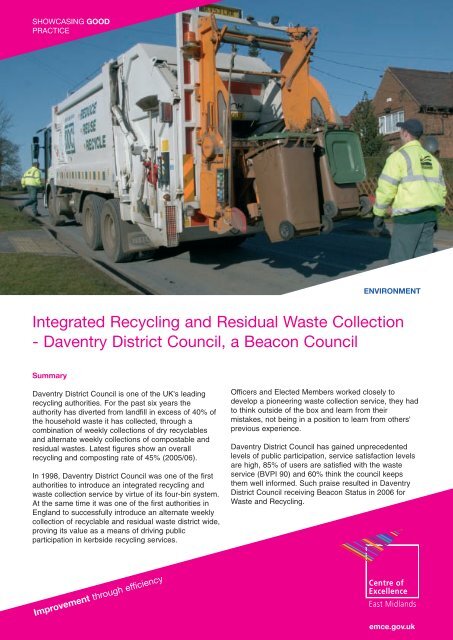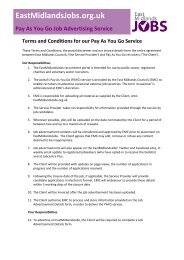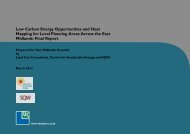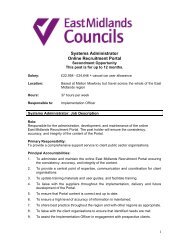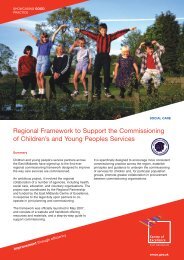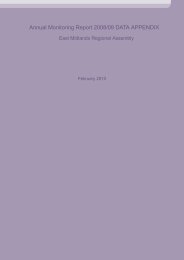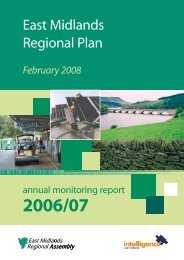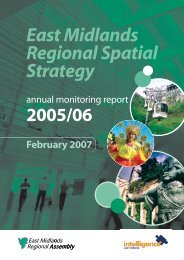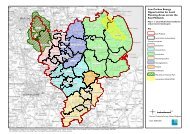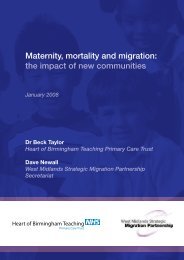Integrated Recycling and Residual Waste Collection - East Midlands ...
Integrated Recycling and Residual Waste Collection - East Midlands ...
Integrated Recycling and Residual Waste Collection - East Midlands ...
Create successful ePaper yourself
Turn your PDF publications into a flip-book with our unique Google optimized e-Paper software.
SHOWCASING GOODPRACTICEENVIRONMENT<strong>Integrated</strong> <strong>Recycling</strong> <strong>and</strong> <strong>Residual</strong> <strong>Waste</strong> <strong>Collection</strong>- Daventry District Council, a Beacon CouncilSummaryDaventry District Council is one of the UK's leadingrecycling authorities. For the past six years theauthority has diverted from l<strong>and</strong>fill in excess of 40% ofthe household waste it has collected, through acombination of weekly collections of dry recyclables<strong>and</strong> alternate weekly collections of compostable <strong>and</strong>residual wastes. Latest figures show an overallrecycling <strong>and</strong> composting rate of 45% (2005/06).In 1998, Daventry District Council was one of the firstauthorities to introduce an integrated recycling <strong>and</strong>waste collection service by virtue of its four-bin system.At the same time it was one of the first authorities inEngl<strong>and</strong> to successfully introduce an alternate weeklycollection of recyclable <strong>and</strong> residual waste district wide,proving its value as a means of driving publicparticipation in kerbside recycling services.Officers <strong>and</strong> Elected Members worked closely todevelop a pioneering waste collection service, they hadto think outside of the box <strong>and</strong> learn from theirmistakes, not being in a position to learn from others'previous experience.Daventry District Council has gained unprecedentedlevels of public participation, service satisfaction levelsare high, 85% of users are satisfied with the wasteservice (BVPI 90) <strong>and</strong> 60% think the council keepsthem well informed. Such praise resulted in DaventryDistrict Council receiving Beacon Status in 2006 for<strong>Waste</strong> <strong>and</strong> <strong>Recycling</strong>.Improvement through efficiencyemce.gov.uk
Project backgroundDaventry District Council has made dramatic changesto its refuse collection services over recent years in anattempt to meet the various recycling <strong>and</strong> compostingtargets which have been aimed at waste collectionauthorities.The publication of 'Making <strong>Waste</strong> Work' in 1995 setlocal authorities an 'aspirational' target to recycle 25%of their household waste by 2000.“Daventry was prepared to make radicalchanges to its service, far ahead ofother authorities, <strong>and</strong> lead citizensthrough the necessary changes toensure high participation - up to 95% insome areas”.Daventry District Council differed from most in that itwas keen to achieve the Government's 'aspirational'targets prior to the introduction of more recent statutorytargets. Without Daventry’s political will <strong>and</strong> vision, thechanges that have been made would not have beenpossible, <strong>and</strong> its example of high diversion recycling,would not have been available for so many otherauthorities to emulate.Key steps1995 - The 'Red <strong>and</strong> Blue box Scheme'The authority took the decision to introduce a weeklykerbside collection of dry recyclables in 1995 using twokerbside boxes. The 'red <strong>and</strong> blue box scheme' enabledresidents to recycle newspapers, magazines, paper,clothing <strong>and</strong> shoes through the red box, <strong>and</strong> plasticbottles, steel <strong>and</strong> aluminium cans, <strong>and</strong> glass bottlesthrough the blue box. Residents were provided with freeboxes <strong>and</strong> their recyclable items were collected on aweekly basis from their kerbside.1998 - Green <strong>Waste</strong> TrialThe authority introduced a compostable wastecollection service to 5,500 households in the east of thedistrict. The trial involved the distribution of a second240 litre wheeled bin to all properties in the area. Thecollection of the brown bin containing garden waste aswell as organic kitchen waste was to alternate with thecollection of the grey wheeled bin containing theresidual waste.1998 - Community Communication <strong>and</strong> EducationProgrammeTo support the organic waste collection trial, DaventryDistrict Council secured l<strong>and</strong>fill tax funding <strong>and</strong>employed <strong>Waste</strong> Watch to run a communication <strong>and</strong>education programme. The communication programmewas there to provide information <strong>and</strong> advice tohouseholders, <strong>and</strong> to stimulate interest in the trial.Surveys were taken throughout the trial to ascertainhouseholder perceptions <strong>and</strong> to obtain feedback on thecommunication methods used. Although initially therewas some confusion <strong>and</strong> concern over the change inservice, generally it was received <strong>and</strong> managed well.“There is excellent internal <strong>and</strong> externalcommunication on priorities. TheCouncil maintains clear contact with itspublic, partners <strong>and</strong> staff”.CPA Assessment Judgement, May 20041999 - District-wide alternate weekly wastecollection serviceBy changing the frequency of the collection of residualwaste from weekly to fortnightly, <strong>and</strong> imposing a policyof not collecting side waste, residents were 'forced', dueto the limited capacity of their grey wheeled bin, torecycle more of their dry recyclables (plastic bottles,cans, paper etc). Those that did not recycle found thatthey generated more refuse than would fit in the onewheeled bin <strong>and</strong> were left with additional waste thatthey had to find alternative ways of disposing of.The council considered the organic waste trial asuccess in January 1999 by which time recycling ratesin the trial area had exceeded 50% <strong>and</strong> the go-aheadwas given for the authority to introduce alternate weeklycollections of organic waste <strong>and</strong> refuse district-wideduring the year 1999-2000. Since September 1999, all32,000 households within the district have had the fourbin collection service. Red <strong>and</strong> blue boxes are emptiedweekly, whilst the grey <strong>and</strong> brown wheeled bins areemptied on alternate weeks.Present dayDaventry District Council now operates an integratedwaste collection service, <strong>and</strong> has consistently achievedone of the highest recycling rates in Engl<strong>and</strong> over thelast six years. This adoption of an integrated wastecollection service has taken significant financial <strong>and</strong>staff resources <strong>and</strong> has required on-going education<strong>and</strong> support for the residents of the district who are noweducated to appreciate the Council's achievement. Thecurrent recycling rate of 45% (2005-06) is far in excessof the statutory target of 30% set for the Council bycentral Government.The success achieved by Daventry District Council hasbeen recognised nationally with the authority beingused as a best practice case study by the LGA, Friendsof the Earth <strong>and</strong> the Resource Recovery Forum. Thetwin bin <strong>and</strong> box scheme has been advocated as thepreferred collection system for all partners within theNorthamptonshire <strong>Waste</strong> Partnership (NWP), in orderthat the County is able to meet the recycling <strong>and</strong>composting targets agreed within Northamptonshire'sJoint <strong>Waste</strong> Management Strategy, <strong>and</strong> to reduce theamount of waste disposed via l<strong>and</strong>fill, in line with LATStargets <strong>and</strong> the EU L<strong>and</strong>fill Directive.Improvement through efficiency
The futureBy signing up to the Northamptonshire Joint <strong>Waste</strong>Management Strategy in 2002, Daventry agreed tocontinue in its efforts to encourage residents tosegregate their waste for recycling with the aim ofachieving diversion from l<strong>and</strong>fill of 50% or more by2020. The authority is well aware that this next 5%improvement in performance may well be the mostdifficult, as it will involve engaging with those residentswhom, for whatever reason, have not been 'switchedon' to recycling over the past 10 years. However, theauthority has shown its commitment to the service inthe past, <strong>and</strong> will continue to support the drive for anefficient <strong>and</strong> effective integrated recycling <strong>and</strong> wastecollection service for the residents of Daventry <strong>and</strong>Northamptonshire.Future objectives include:Achieve a target to recycle/compost 50% of thewaste we collectEstablish the efficiency savings available throughimprovements to waste <strong>and</strong> recycling collectionrounds <strong>and</strong> / or through integration of servicesbetween districtsPursue the provision of an in-vessel compostingfacility within Northamptonshire via theNorthamptonshire <strong>Waste</strong> Partnership to enablekitchen waste to be collected for compostingPromote waste reduction, re-use, recycling <strong>and</strong>composting amongst residents <strong>and</strong> increaseparticipation in kerbside recycling servicesTransferabilityDue to the high profile of the waste collection agendamany authorities have subsequently chosen tointroduce integrated collection systems similar toDaventry's. Many of these authorities have visitedDaventry District Council for advice <strong>and</strong> assistance, thishas enabled the experience <strong>and</strong> lessons learned to beshared. The following is a selection of authorities thathave learnt from Daventry District Council <strong>and</strong> are nowreporting significant improvements in their kerbsidediversion figures:Harborough District CouncilKettering Borough CouncilLichfield District Council (Beacon Status)Rushcliffe Borough Council (Beacon Status).For those authorities struggling to meet statutorytargets, Daventry District Council can show them theroute that it chose to take, highlighting how it developeda service to suit its population, raised awareness withElected Members <strong>and</strong> residents, dealt with serviceimplementation, opposition <strong>and</strong> the 'unexpected' withregards the following initiatives:Development <strong>and</strong> implementation of a district-wideintegrated recycling <strong>and</strong> waste collection serviceSuccessful implementation of alternate weeklyresidual <strong>and</strong> green waste collectionsLong-term commitment from Elected MembersProactive waste education <strong>and</strong> communicationprogrammeWork in partnership with Northamptonshire <strong>Waste</strong>Partnership to procure joint waste collection <strong>and</strong>treatment arrangements.“As a small authority, the Council hasbeen particularly effective atmaximising its capacity by efficientorganisational development <strong>and</strong> jointworking with other public sectorpartners”.CPA Assessment Judgement, May 2004Engagement with areas of low participationKey player in the formation of the Northamptonshire<strong>Waste</strong> Partnership.For those authorities who have achieved relevantsuccess, but who are looking towards longer-termtargets, Daventry District Council can share itsexperience of engaging with the 'more difficult' sectorsof their communities. Being a Beacon authority hasgiven Daventry the opportunity to share its experienceswith others whilst, at the same time, allowing them anopportunity to improve their own service further bylistening to <strong>and</strong> learning from their regional <strong>and</strong> nationalcolleagues.2006-2007<strong>Waste</strong> & <strong>Recycling</strong>ContactSue ThomasBeacon CoordinatorDaventry District Counciltel: 01327 302 513e-mail: sthomas@daventrydc.gov.ukImprovement through efficiency


